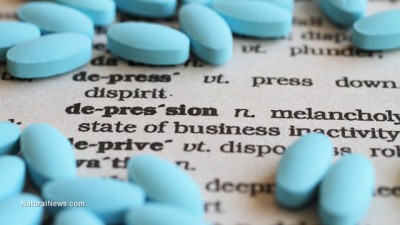Depression Drug Medical Fraud: Vast Majority Prescribed Dangerous Mind-altering Drugs Don’t Even Have Depression

A recent study indicates that more than two-thirds of people who have been prescribed antidepressants are likely not suffering from depression at all. Sixty-nine percent of those taking SSRIs (selective serotonin reuptake inhibitors) do not display the classic symptoms of major depressive disorder, which is commonly known as clinical depression, according to a report published in the Journal of Clinical Psychiatry.
SSRIs are also prescribed for other mental disorders, including generalized anxiety disorder, social phobia, obsessive compulsive disorder, and panic disorder, but the researchers found that 38 percent of those taking the drugs did not meet the criteria for these conditions either.
Commonly considered to have fewer side effects than other antidepressants, SSRIs are the most prescribed class of drugs for treating depression and other psychiatric disorders.
The authors of the study wrote:
Many individuals who are prescribed and use antidepressant medications may not have met criteria for mental disorders. Our data indicate that antidepressants are commonly used in the absence of clear evidence-based indications.
Between 1988 and 2008, the use of antidepressants increased almost 400 percent, with 11 percent of Americans now taking these drugs regularly.
Why are these drugs being over-prescribed?
The answer might be that temporary periods of mental stress are being misdiagnosed as clinical depression. Dr. Howard Forman, medical director of the Addiction Consultation Service at Montefiore Medical Center, is one of those who subscribe to this theory.
According to Dr. Forman:
We all experience periods of stress, periods of sadness, and periods of self-doubt. These don’t make us mentally ill, they define us as human.
He also points out that although psychotherapy might be a better way of treating these conditions, there are “roadblocks” involved, including cost, scarcity of qualified therapists, and the time demands those experts face.
The official U.S. guidelines for diagnosing clinical depression are when a “person has five or more depressive symptoms over a two week period, most of the day, nearly every day.”
Symptoms of clinical depression range from a depressed mood to thoughts of suicide. They might also include a lack of interest in normal activities, changes in weight or appetite, insomnia or too much sleep, restlessness, fatigue, guilty feelings and problems with concentration or decision-making.
Although SSRIs are considered to be safer than other antidepressants, they are not without potentially serious side effects. Studies have shown that the use of antidepressants involves an “increased risk of suicidal behaviour and thoughts in children and adolescents, particularly in the early stages of treatment.” The use of Prozac and Seroxat actually doubles the risk of suicidal behavior among young people.
Studies have also indicated an increased risk of children being born with autism when their mothers take SSRIs during pregnancy.
Considering the risks, these drugs should never be casually prescribed. However, in this climate of increased reliance on pills to solve every problem, over-prescription of medications is rampant, particularly in the U.S.
Big Pharma rakes in more than half a trillion dollars in revenues each year and spends billions advertising its products. This is most likely the real reason that antidepressants are being over-prescribed.
Drug manufacturers apply pressure and provide incentives to doctors to prescribe more pharmaceuticals than necessary. One study revealed that “drug companies have a tremendous incentive to find new conditions to treat with existing drugs, and when they can’t, they invent them.”
That’s right: the drug makers invent disorders out of thin air just so they can sell more of their products, according to an article posted by the Drug and Alcohol Testing Compliance Services (DATCS) website:
For example, the drug Sarafem is really Prozac with a different name and a different color capsule. It’s patented, approved, and promoted for the treatment of “Premenstrual Dysphoric Disorder” which is defined as the sadness, irritability, tension, and moodiness that might occur prior to menstruation. Even though this drug isn’t any more effective at treating these symptoms than generic Prozac, it’s up to three times as expensive.
Another tactic is to “change the definition of existing diseases,” says the DATCS:
For example, changes to blood pressure and cholesterol level guidelines could qualify millions of new people for prescription medication literally overnight. When this happens, it’s not uncommon for the supporters of such changes to have financial ties to the drug companies that would benefit most.
These profit-motivated tactics should be recognized as what they really are: criminal behavior by a cabal of greedy predators. Enough is enough. It’s time to acknowledge and put a stop to these practices.
Notes:
http://www.dailymail.co.uk
http://www.medicaldaily.com
http://www.psychiatrist.com
http://datcs.com

